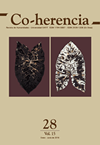The narrative thinking of Spinoza
Main Article Content
Keywords
narration, reason, everyday life, temporality, suggestion
Abstract
Spinoza is far from the so called narrative thought and he prefers the timeless knowledge that reason provides. However, the complexity of human life requires other forms of approach that enable its comprehension in its particular and often contingent context from the point of view of the subject. Therefore, the author permits -even though in a second scheme- a flexible treatment of practical issues, that includes various narrative aspects which make ready and extend rationality. Such is the case of genealogical study of phenomena, political debate, also the learning derived from experience, education, psychophysics biography, the use of suggestion and visualization techniques, etc. Once again, it is about adding tools to develop a lucid and joyful life.
Downloads
References
Cohen, D. (2008). La identidad personal: del cuerpo propio a la ética. En J. Carvajal y M. L. de la Cámara (Coords.), Spinoza: de la física a la historia (pp. 187-203), Cuenca: Ediciones de la Universidad de Castilla-La Mancha.
Carvajal, J. y de la Cámara, Mª L. (2008). Spinoza: de la física a la historia. Cuenca: Ediciones de la Universidad de Castilla-La Mancha.
Espinosa, L. (1995). Spinoza: naturaleza y ecosistema. Salamanca: Ediciones de la UPSA.
Espinosa, L. (1996). Naturaleza y razón en Spinoza. Cuadernos del Seminario Spinoza, nº 6.
Espinosa, L. (2008). Historia, naturaleza humana y experiencia: nociones transitivas en Spinoza. En J. Carvajal y Mª. L. de la Cámara (Coords.), Spinoza: de la física a la historia (pp. 353-369). Cuenca: Ediciones de la Universidad de Castilla-La Mancha.
Espinosa, L. (2010). Vida y narración: entre la filosofía y la literatura. Isegoría (42), 105-128. Disponible en http://bit.ly/2H81SBq
Espinosa, L. (2014). La política como física del poder. Res Publica, 17(1), 33-57. doi:10.5209/rev_RPUB.2014.v17.n1.4555
Fernández García, E. (2008). Historia de las palabras: la importancia del uso. En J. Carvajal y Mª. de la Cámara (Coords.), Spinoza: de la física a la historia (pp. 205-219). Cuenca: Ediciones de la Universidad de Castilla-La Mancha.
Johnson, M. (1991). El cuerpo en la mente. Madrid: Debate.
Martínez, F. J. (2008). Normatividad y empiria: el recurso a los ejemplos históricos en el Tratado político. En J. Carvajal y Mª. L. de la Cámara (Coords.), Spinoza: de la física a la historia (pp. 407-417). Cuenca: Ediciones de la Universidad de Castilla-La Mancha.
Matheron, A. (1971). Le Christ et le salud des ignorants chez Spinza. Paris: Aubier.
Moreau, P-F. (1994). Spinoza. L´expérience et l´éternité. Paris: PUF.
Peña, J. (2008). Política e historia en Spinoza. En J. Carvajal y Mª. L. de la Cámara, Spinoza: de la física a la historia (pp. 419-437). Cuenca: Ediciones de la Universidad de Castilla-La Mancha.
Ricoeur, P. (1985). Temps et récit, III. Paris: Editions du Seuil.




